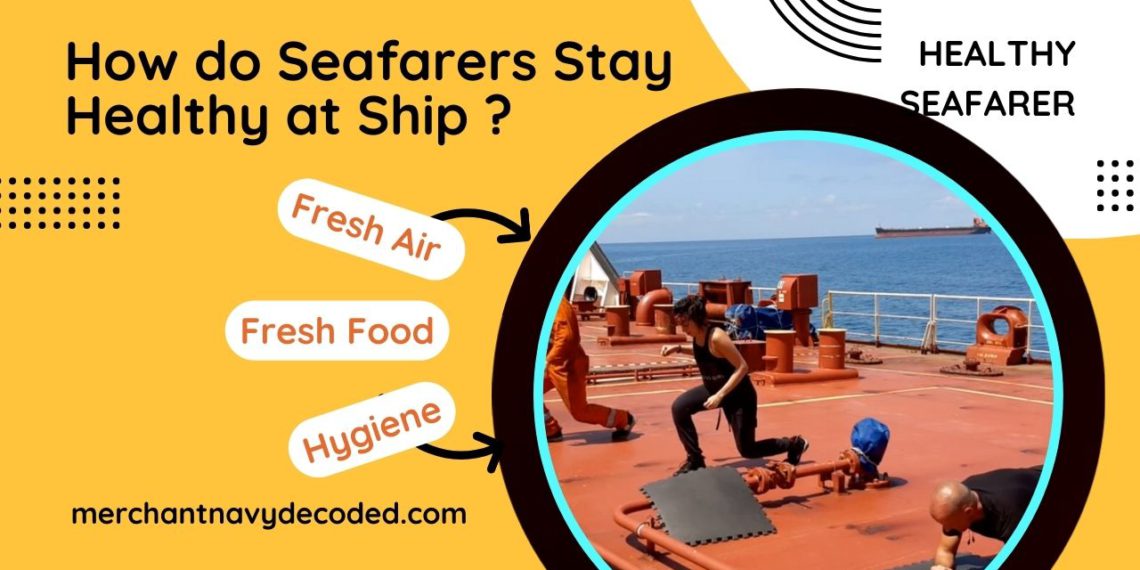How Do Seafarers Stay Healthy at Sea?| Seafarers’ Strong Immunity Secrets| 2023
Why don’t seafarers get sick on ships?
Have you ever wondered why sailors on ships don’t get sick as often as people on land? This blog will explain why. First, before joining a ship, seafarers have to pass a health check, so they don’t bring diseases on board. Also, ships are far from crowded cities, so there are fewer germs around. Ships are kept very clean, and crews are trained to keep them that way. All these things together help sailors stay healthy even though they spend a long time at sea. Let’s explore how they do it!
Seafarers’ Strong Immunity Secrets
Personal Hygiene
Personal hygiene is important for maintaining a healthy and comfortable life on board a ship, ensuring both the well-being of the crew and the efficiency of operations. Maintaining personal hygiene includes various regulations onboard ship:
Weekly Cabin Inspections:
On the ship, we do cabin inspections every week to make sure our cabins are always clean. Officers have their cabins cleaned daily by the stewards.
Separate Laundries: We have two separate laundries. One is for regular clothes, and the other is for dirty boiler suits that get oily and dirty.
Hand Wash and Toilets: We provide free face masks, gloves, and hand sanitizers for everyone on board. This helps us stay clean and safe.
Free Washing and Bathing Soap: Crew members get free washing soap and bathing soap on the ship to keep themselves clean and fresh.
Hygienic Cooking
Keeping the kitchen super clean is a must, especially after a long day at sea. Eating food that’s gone bad can make us really sick. So, we’re extra careful when we cook.
All provisions store room, be it vegetables, meat, or fish, are meticulously stored within refrigerated rooms, guaranteeing an environment inhospitable to bacterial proliferation.
We use separate cutting boards and knives for meat, fish, and vegetables. We have a routine that provides us with three healthy meals a day on the ship.
Who is responsible for hygienic cooking?
Chief cook, possessing comprehensive training, meticulously supervises the galley and storage facilities, upholding the highest standards of cleanliness.
Atmospheric Control
On a ship, the atmospheric control and air conditioning system play a vital role in maintaining a comfortable environment. It’s crucial to strike the right balance with temperature and relative humidity. If it’s too hot or too cold, it can lead to discomfort and even health issues for the crew.
To avoid these problems, the system is set to keep the temperature and relative humidity at optimum levels. This ensures that it’s not excessively hot or cold, making it a more pleasant and healthy environment for everyone on board. Maintaining these ideal conditions is key to the well-being of the crew and the smooth operation of the ship.
Drinking Water

Drinking water quality is a top priority on a ship. If the water isn’t treated properly, it can easily lead to illnesses among the crew. To prevent this, we take several precautions.
We generate fresh water onboard the ship then treat the water by adding necessary minerals to ensure it’s safe to drink. Additionally, we conduct weekly tests on the fresh water supply to ensure it meets the required quality standards. These measures help keep the crew healthy by providing safe and clean drinking water during the voyage.
Sewage Handling
Sewage on ships is stored in holding tanks and later transferred to shore facilities, where approved sewage treatment plants ensure proper treatment and disinfection. This responsible approach safeguards the environment and complies with sanitation regulations.
Garbage Management
Garbage management on ships is an important process that involves segregating waste. A well-structured garbage management plan is essential to ensure responsible disposal and minimise the impact on the environment.
Food Waste Management
Food wastage is a critical consideration on ships. Comminuted food waste, which can’t be safely discarded overboard, is stored in a separate refrigerator to prevent the spread of bacteria and viruses. In most cases, comminuted food waste can be disposed of safely at sea.
Clean Air
Clean air on ships is vital for crew health and operational efficiency. Proper ventilation systems prevent the spread of illnesses and maintain equipment performance. It also upholds environmental responsibility by complying with emissions regulations, contributing to a healthy onboard environment and the preservation of the environment.
Why do seafarers often lead healthy lives on board ships?
Seafarers’ good health on board ships is the result of various factors, including isolation from crowded areas, thorough health checks, strict hygiene practices, and advanced ventilation systems for clean air. These elements collectively contribute to their overall well-being while at sea.
Conclusion
In conclusion, seafarers’ robust health at sea can be attributed to several key factors and foremost, the isolation from crowded urban areas helps minimise exposure to disease-causing agents. Rigorous pre-boarding health checks ensure that crew members are in good health, preventing the introduction of diseases. Strict hygiene practices and sanitation standards are maintained on ships to minimise disease transmission. Advanced ventilation systems guarantee a continuous supply of clean and fresh air. Lastly, a collective commitment to preserving a clean and controlled ship environment plays a pivotal role in promoting the well-being of sailors during their extended journeys. These factors together underscore the resilience of seafarers in maintaining good health at sea.
Now you know how do seafarers stay healthy on the ship but do you know how do seafarer handle seasickness onboard ?
Disclaimer :- The opinions expressed in this article belong solely to the author and may not necessarily reflect those of Merchant Navy Decoded. We cannot guarantee the accuracy of the information provided and disclaim any responsibility for it. Data and visuals used are sourced from publicly available information and may not be authenticated by any regulatory body. Reviews and comments appearing on our blogs represent the opinions of individuals and do not necessarily reflect the views of Merchant Navy Decoded. We are not responsible for any loss or damage resulting from reliance on these reviews or comments.
Reproduction, copying, sharing, or use of the article or images in any form is strictly prohibited without prior permission from both the author and Merchant Navy Decoded.


